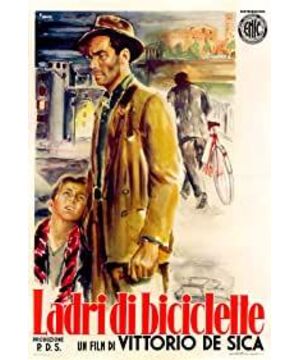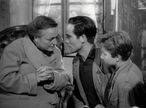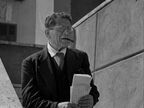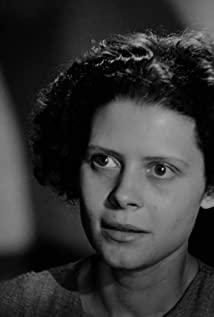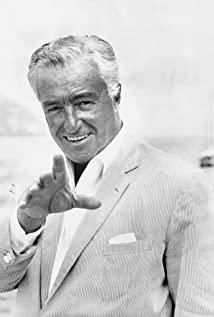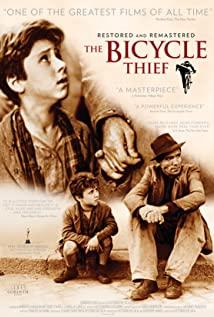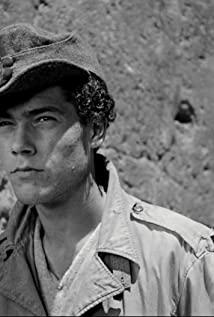The first question is, is there something for us that we can't live without if we lose it. Not sure what the person being asked will come up with. In short, it will not be a bicycle, a bicycle without any commemorative significance, just as a means of transportation. So imagine yourself in a situation where your family depends on you to survive, and you've managed to find a job. But the job requirement is that you have to have a bike. You're broke, you end up pawning the only valuable bed sheet in the house (which means you don't sleep with sheets), and you end up using the pawn money to buy a bike. From now on, you can finally look forward to making money to support your family. You will have bread, new sheets, and everything. At this time, is this bicycle just a simple means of transportation for you?
This is the situation of Antonio, the protagonist of the movie "The Bicycle thieves". After World War II, Italy was a crowded and depressed street full of unemployed homeless people, full of anxiety and anxiety, gray and despair. With no professional actors, no soundstage, and no huge investment, neorealist director Vittorio De Sica quietly records an ordinary thing that happens to a very ordinary Italian. Perhaps many of us have come across it - a bike has been stolen.
"Don't forget to bring your bike, you have to have one."
"I had one, but it broke and I can fix it in a few days."
"They won't want you then."
" Why, I can walk to work."
"Whether you have it or not, if you don't, someone else will get the job."
"I have a bicycle!" "Whoever said only you have it, I have it too!" Work-seeking people began to make noise.
"Antonio, do you have a car or not?"
"I have it, I have it, I have it now."
Where will there be? When Antonio brought home the exciting news that he had found a job, it was just another quarrel. Wife Maria pulled out the sheets and said, "You can sleep without sheets, can't you?"
So Antonio finally got a job, albeit on a low-level like posting posters. Maria came to a "wife" to fulfill her wish, saying that Antonio found a job to fulfill her wish. Antonio pulled her out so she wouldn't waste money on superstition.
On his first day at work, he climbed a ladder to put up posters, and a man in a German military hat mounted a bicycle he had set aside and sprinted into the crowd. Antonio yelled and chased, but eventually the thief and his bike disappeared from view.
He and his son Bruno began a desperate search for the stolen bike. In the huge bicycle market, there is no one with the same number as his, and he saw the thief who stole the car, but he let him slip away. In order to find the bicycle, he broke into the church and ruined the Mass. In order to find the bicycle, he asked the "goddess" who had once made him dismissive. However, the clue is always cut off as soon as it appears, and all efforts seem to be unable to find its attribution. "The goddess" said, either you will see it soon, or you will never think about it for the rest of your life. After leaving the house of the goddess, he saw the thief who stole the car for the third time, but because there was no evidence, he was blasted out of the block where the thief lived in disgrace. None of the friends, the police, and the crowd could help him.
He squatted on the corner of the street, looked at the neatly arranged rows of bicycles on the opposite street, looked at a solitary bicycle under a building not far away, looked at the people riding bicycles in front of him, and looked at it. Finally, He got up and handed the child a banknote and let him go back by himself on the bus, while he ran to the lonely bicycle. He stepped on the pedals and rode down the street. So the film changed from "A bicycle thief" to "bicycle thieves". Someone shouted from behind, catch the thief, catch the car thief. He was eventually caught, and people surrounded him saying they were going to jail. He was overwhelmed, but found that his son didn't leave. Bruno grabbed the corner of his shirt and called Dad, Dad, for fear that the people around him would hurt him. The car owner looked at the innocent eyes of the child and said let it go and let him go.
On the bustling street, Bruno clasped Antonio's hand and walked forward, and the two were gradually hidden in the crowd.
It seems like a long story has been told. As a representative work of neorealism, is this work realistic? This was questioned by many American classmates in the same class. They felt that the work exaggerated the sadness and added such a sappy ending. The word Sappy cannot be looked up in an English-Chinese dictionary. A hundred people have a hundred different understandings of what it means.
But this is the reality. Isn't the reality full of sadness and despair all the time? Isn't Antonio's story a reflection of people's real life? In this work, the bicycle is no longer a simple means of transportation. Some people find support for life because of it, but also lose hope of life because of him, and even force the good into theft. It's a symbolic thing, it's like laughing at everyone and saying, look, sometimes you can't live without an object like me. But what does this film show, the darkness of politics, or the hardships of life? I don't think so, it just shows the truth.
Vittorio De Sica just wanted to record the real Italy at that time, the real life of people. So we can also find a few delightful parts of the movie. For example, Antonio seemed to let go of everything in desperation, and took his son Bruno to a restaurant for a good meal. He had to drink, and even let Bruno drink. There was a smile on his face, as if everything had been put down. Another example is that when the car owner saw Bruno's eyes and felt sympathetic, he might be thinking, if Antonio is sent to prison, then this child will lose his support, and how will he live in the future. So he let Antonio go. However, the short-lived joy was followed by a deep despair. In the restaurant, Antonio thought of the stolen bicycle again; after being let go by the owner, the story came to an end, and the two gradually poured into the crowd. Unfinished stories, like deeper despair, how will he live without his bike, he doesn't even have sheets, he's going to lose his job. . . .
In today's flood of commercial films, realistic films are facing an embarrassing box office market. The closer things are to life, the more people are reluctant to approach them. It seems that I want to lock myself in an imaginary dream, only touching the illusory and beautiful, but avoiding the real. Maybe not everyone will be unable to live for a bicycle, and it has been more than sixty years since the film was shot. However, no matter how the times change, there are always those who are worried about their livelihood and those who are desperate because of material loss. One day, when our illusory dreams are shattered, we need to live in reality. And part of the reality, as depicted in the movie. We're going to be like Antonio, swarming the crowd, or we're going through the crowd right now. Hopefully we won't be as desperate as he was. Hope no matter how realistic, hope is always by our side.
View more about Bicycle Thieves reviews


